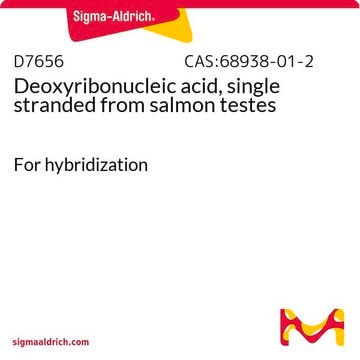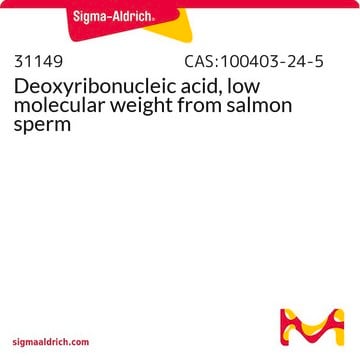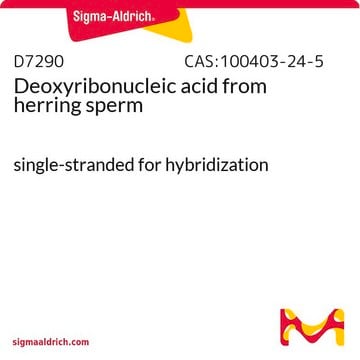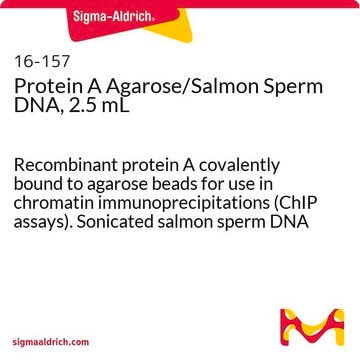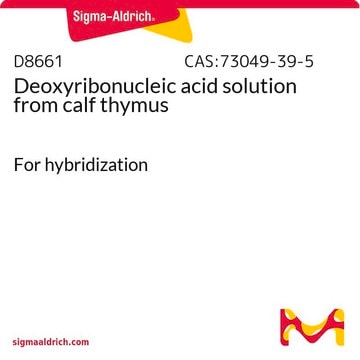The specific salmon species is not determined for this product. See the link below to review a sample Certificate of Origin for this material:
https://www.sigmaaldrich.com/coo/undefined/D9156/SLBM7249V.
Kluczowe dokumenty
D9156
Deoxyribonucleic acid, single stranded from salmon testes
For hybridization
Synonim(y):
single-stranded template DNA
Wybierz wielkość
418,00 zł
Wybierz wielkość
About This Item
418,00 zł
Polecane produkty
pochodzenie biologiczne
fish testis (salmon)
Poziom jakości
klasa czystości
for molecular biology
Próba
9-11 mg/mL (DNA concentration)
Formularz
solution
stężenie
10 mg/mL in H2O
Warunki transportu
dry ice
temp. przechowywania
−20°C
Szukasz podobnych produktów? Odwiedź Przewodnik dotyczący porównywania produktów
Powiązane kategorie
Opis ogólny
Zastosowanie
In order to decrease any non-specific hybridization of the probe to a substrate, blocking agents must be used. Generally, a combination of blocking reagent, detergent, and denatured, fragmented DNA is used to accomplish this. Sigma offers sonicated, denatured DNA from a variety of species for use as a blocking agent in Northern and Southern blotting and other nucleic acid hybridization techniques.
Uwaga dotycząca przygotowania
Inne uwagi
produkt powiązany
Kod klasy składowania
11 - Combustible Solids
Klasa zagrożenia wodnego (WGK)
WGK 3
Temperatura zapłonu (°F)
Not applicable
Temperatura zapłonu (°C)
Not applicable
Środki ochrony indywidualnej
Eyeshields, Gloves, type N95 (US)
Wybierz jedną z najnowszych wersji:
Certyfikaty analizy (CoA)
Nie widzisz odpowiedniej wersji?
Jeśli potrzebujesz konkretnej wersji, możesz wyszukać konkretny certyfikat według numeru partii lub serii.
Masz już ten produkt?
Dokumenty związane z niedawno zakupionymi produktami zostały zamieszczone w Bibliotece dokumentów.
Klienci oglądali również te produkty
Produkty
Transformation introduces exogenous DNA into cells, a fundamental genetic modification process demonstrated in Streptococcus pneumoniae.
Protokoły
Yeasts are considered model systems for eukaryotic studies as they exhibit fast growth and have dispersed cells.
Learn Northern and Southern blotting basics, with protocols and applications for macromolecule transfer to membrane supports.
Poznaj podstawy blottingu Northern i Southern, wraz z protokołami i aplikacjami do przenoszenia makrocząsteczek na nośniki membranowe.
-
What Salmon sp. D9156 is prepared from?
1 answer-
Helpful?
-
Active Filters
Nasz zespół naukowców ma doświadczenie we wszystkich obszarach badań, w tym w naukach przyrodniczych, materiałoznawstwie, syntezie chemicznej, chromatografii, analityce i wielu innych dziedzinach.
Skontaktuj się z zespołem ds. pomocy technicznej